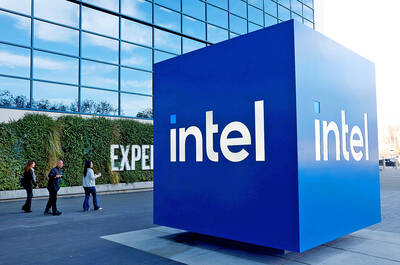Compal Electronics Inc (仁寶), the world’s second-largest contract manufacturer of laptop PCs, yesterday announced that it was purchasing Toshiba Corp’s LCD TV manufacturing plant in Mexico as part of its efforts to boost LCD TV production.
The Taiwanese maker said in a statement that it has entered into a contract to acquire Toshiba Electromex SA de CV, which is located in Ciudad Juarez, Mexico.
The statement did not disclose investment figures except to say the deal was expected to be completed by September, pending regulatory approval.
The deal is expected to help Compal secure stable orders from Toshiba, which is one of Compal’s major TV customers.
Brand customers will sometimes sell their production facilities to contract manufacturers as a means to save costs and outsource future orders.
Through the purchase, contract manufacturers hope to ensure stable orders from these clients and at the same time expand production facilities.
For instance, Hon Hai Group (鴻海集團) spent NT$100 million (US$3 million) in 2005 to acquire assets of two of Hewlett-Packard Co’s manufacturing facilities, one each in Australia and India.
In 2008, Hon Hai invested US$18 million to buy a cellphone manufacturing plant in Mexico from Motorola Inc.
“By acquiring Toshiba Electromex, Compal looks forward to expanding LCD TV manufacturing flexibility, diversified sales mix, and revenue growth momentum in the future,” the statement said.
Compal president Ray Chen (陳瑞聰) said at the Computex technology trade fair in Taipei early last month that the company was setting its sights on “four screens” to fuel future growth momentum.
These four screens are notebooks, tablet PCs, TVs and smartphones.
The company expects to produce 8 million LCD TVs this year, up from last year’s 5.4 million, he said.
Shares of Compal closed down 1.5 percent to NT$33.5 on the Taiwan Stock Exchange yesterday.

Sweeping policy changes under US Secretary of Health and Human Services Robert F. Kennedy Jr are having a chilling effect on vaccine makers as anti-vaccine rhetoric has turned into concrete changes in inoculation schedules and recommendations, investors and executives said. The administration of US President Donald Trump has in the past year upended vaccine recommendations, with the country last month ending its longstanding guidance that all children receive inoculations against flu, hepatitis A and other diseases. The unprecedented changes have led to diminished vaccine usage, hurt the investment case for some biotechs, and created a drag that would likely dent revenues and

Global semiconductor stocks advanced yesterday, as comments by Nvidia Corp chief executive officer Jensen Huang (黃仁勳) at Davos, Switzerland, helped reinforce investor enthusiasm for artificial intelligence (AI). Samsung Electronics Co gained as much as 5 percent to an all-time high, helping drive South Korea’s benchmark KOSPI above 5,000 for the first time. That came after the Philadelphia Semiconductor Index rose more than 3 percent to a fresh record on Wednesday, with a boost from Nvidia. The gains came amid broad risk-on trade after US President Donald Trump withdrew his threat of tariffs on some European nations over backing for Greenland. Huang further

HSBC Bank Taiwan Ltd (匯豐台灣商銀) and the Taiwan High Prosecutors Office recently signed a memorandum of understanding (MOU) to enhance cooperation on the suspicious transaction analysis mechanism. This landmark agreement makes HSBC the first foreign bank in Taiwan to establish such a partnership with the High Prosecutors Office, underscoring its commitment to active anti-fraud initiatives, financial inclusion, and the “Treating Customers Fairly” principle. Through this deep public-private collaboration, both parties aim to co-create a secure financial ecosystem via early warning detection and precise fraud prevention technologies. At the signing ceremony, HSBC Taiwan CEO and head of banking Adam Chen (陳志堅)

Intel Corp shares plunged as much as 14 percent in late trading after chief executive officer Lip-Bu Tan (陳立武) gave a lackluster forecast and warned that the chipmaker was struggling with manufacturing problems. First-quarter projections for revenue and earnings fell well short of Wall Street estimates and a conference call with analysts, in which Tan said it would take “time and resolve” to turn around the company, sent the shares down further. Production snags have hampered the comeback bid, a disappointment for investors who anticipated more of a boost from new products. “We are on the multiyear journey,” Tan said. Intel, the largest maker